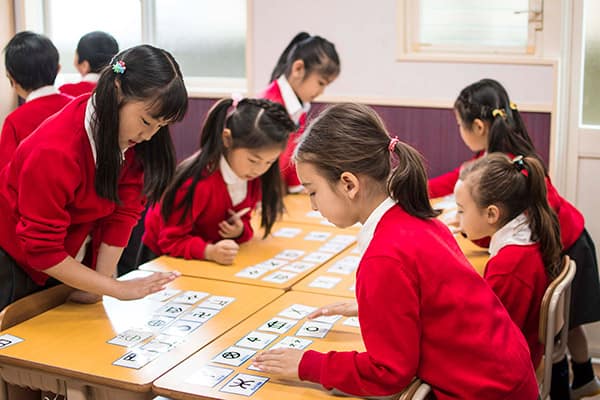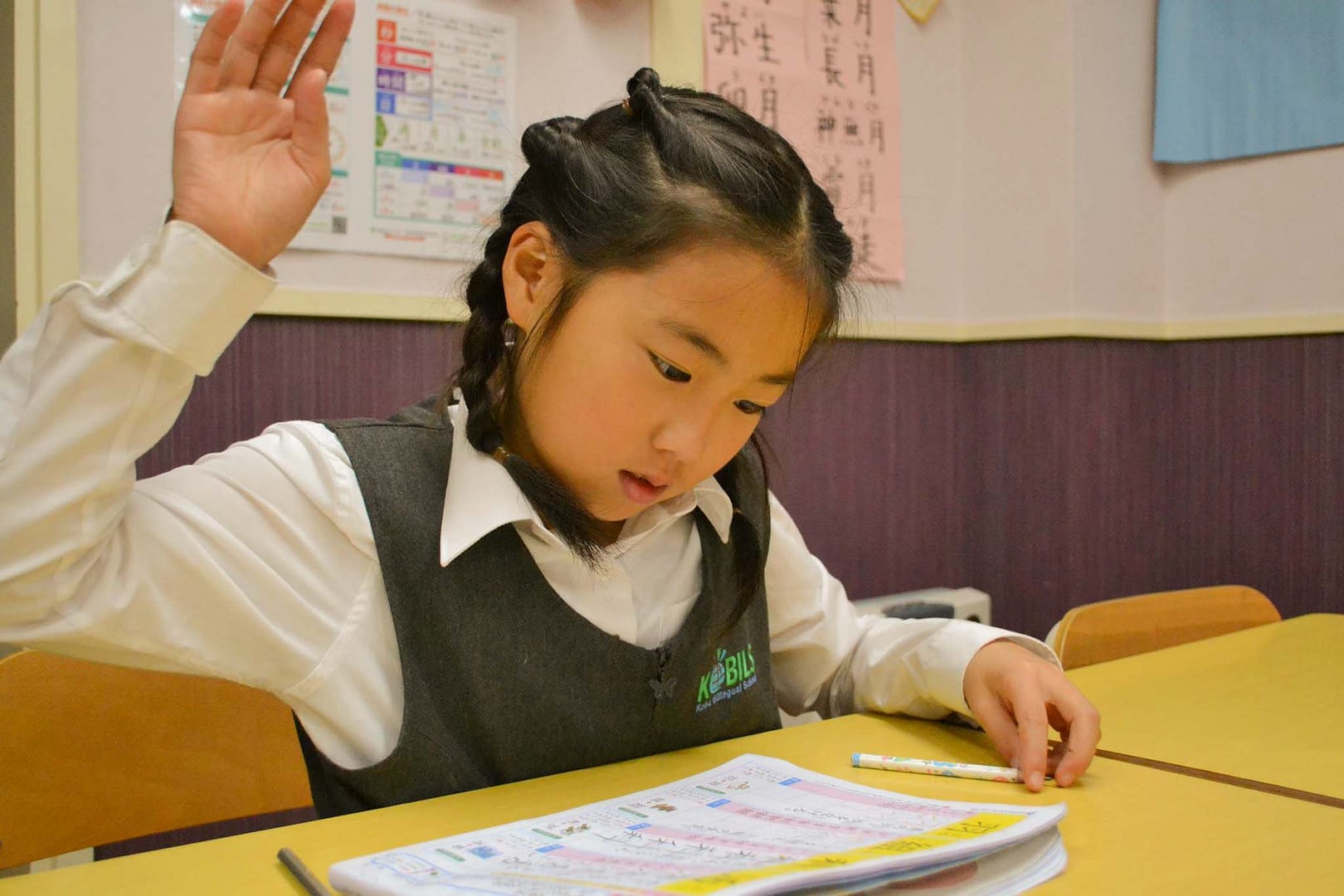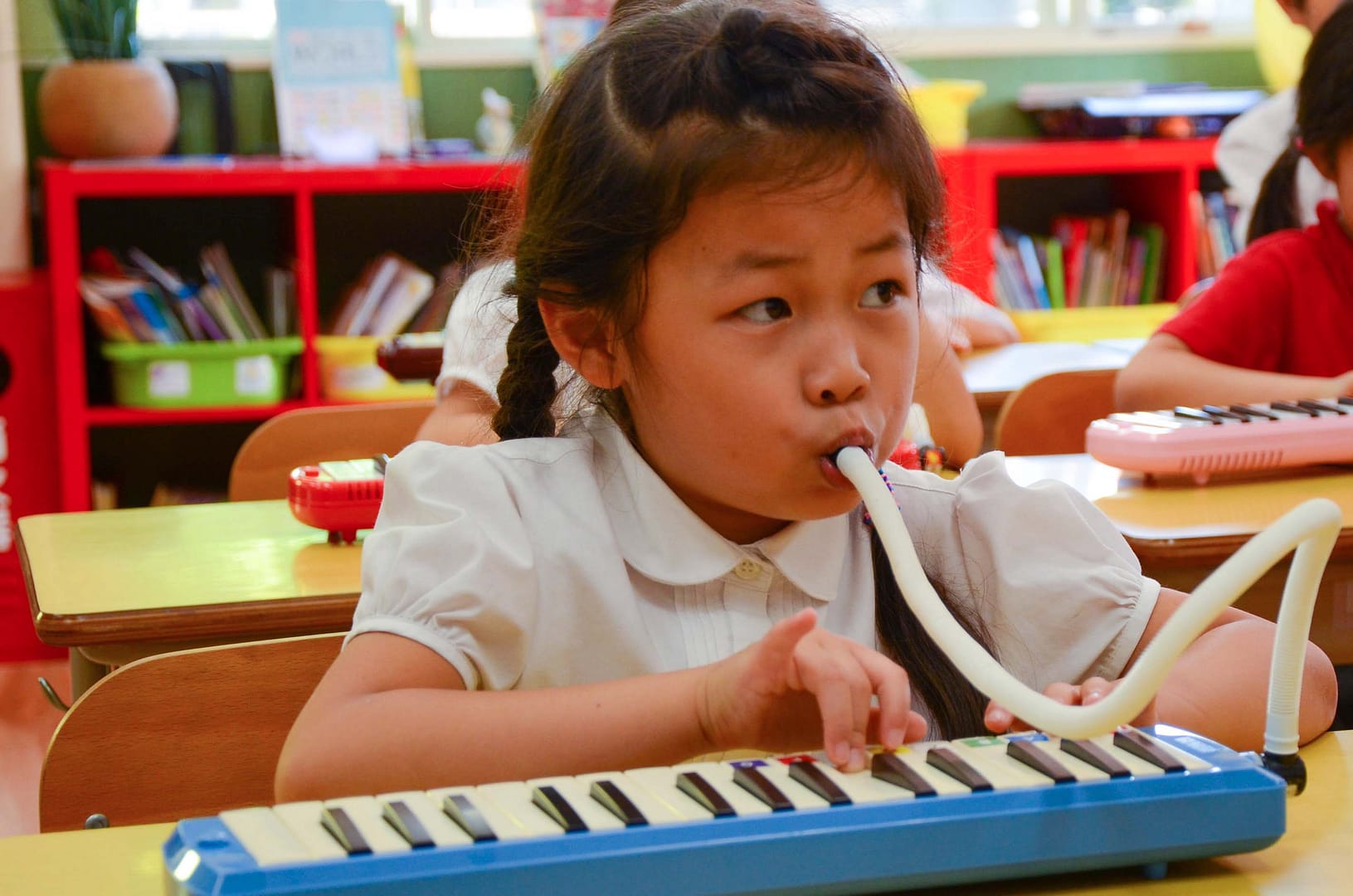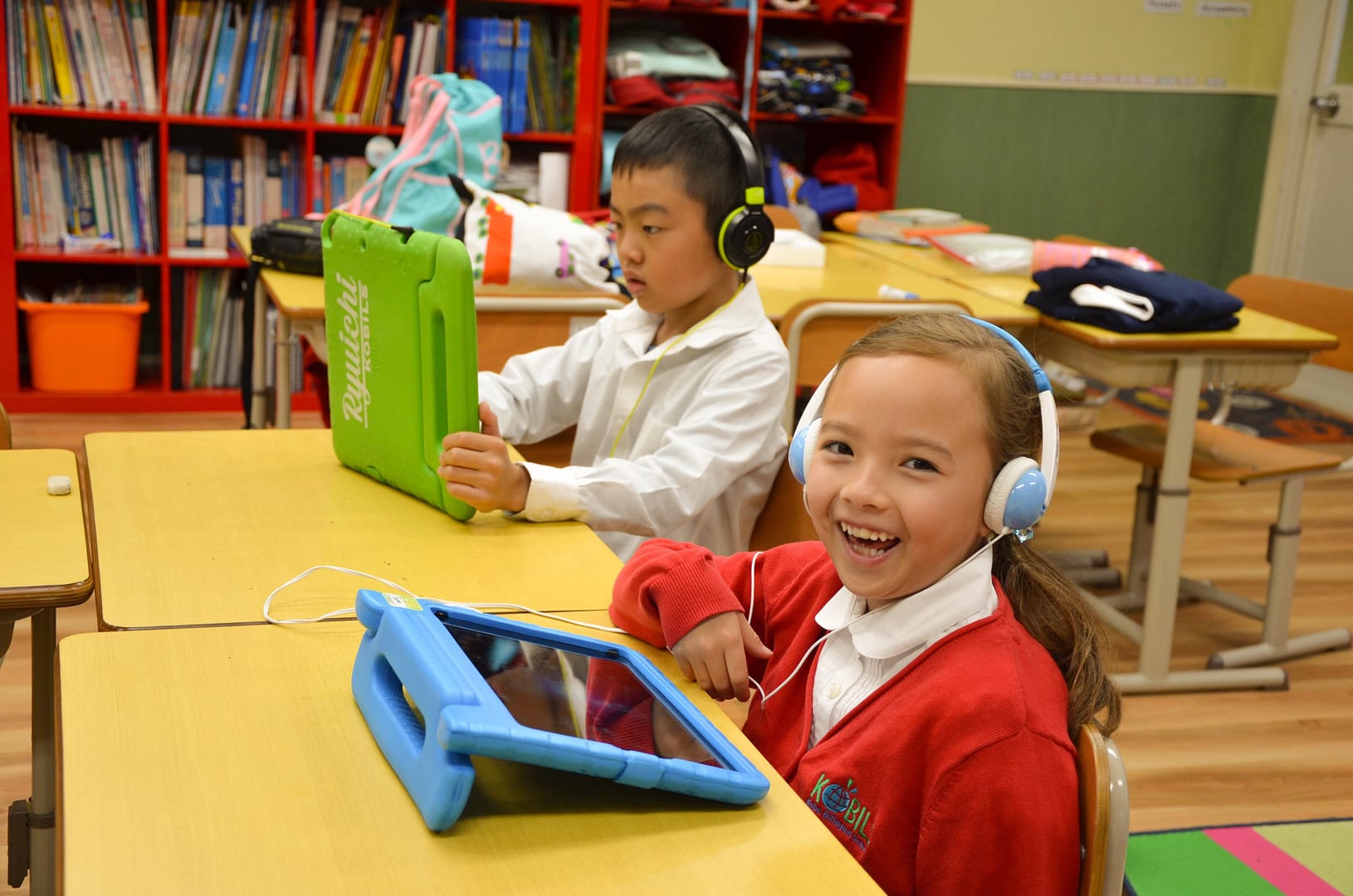Kobe Bilingual School
HOME | KINDERGARTEN | ELEMENTARY | SUBJECTS | FAQ | COMPARISON | FEATURES | FEES
Subjects:
The eight curriculum areas or subjects in the CfE and KOBILS curriculum are:
Languages A: English
English is taught through a rich offering of texts from throughout the world. English as a second language (ESL) is incorporated into the curriculum and children enjoy some classes together and some in level specific smaller groups. Mechanics of the language, both spelling and grammar, as well as “writer’s workshop” are introduced and children learn to write for pleasure, taking into account their own interests and their readers’ interests. Children learn strategies for writing fast, writing well, and reading for information and learning.
AT KOBILS we love to read and we encourage children to read extensively through our own library, with Oxford Reading Tree and a whole host of other series and one off books (children can take home 4 books at one time). Children also have subscriptions to websites like raz-kids.com and IXL Math. Teachers demonstrate a love of reading and writing by sharing their own writing with children, by responding naturally to children’s writing, and by enthusiastically reading aloud through all the grade levels. An annual Reading Marathon has children raising money for charity while being encouraged to read as much as possible. Although we do occasional book reports as academic exercises the aim of KOBILS’ and CfE’s reading program is for children to learn to love books by reading for enjoyment and lifelong learning.
Literacy is encouraged across the curriculum, so English is often scheduled back to back with social studies and art for example. In this way children can explore projects together with writing and reading in the real word for research and drawing, painting and crafting to illustrate their “English” learning and promote finding answers and inquisitiveness.
Listening and talking are specifically provided for across the curriculum, with specific attention paid to sharing opportunities – show and tell and about my life – as well as specific opportunities to present information, for drama, and for developing an argument, discussing and debating.
Although children are taught at their own level, and improvement rather than grade level goals is stressed, all children should be ready to enter international schools at grade 7 / year 8 / S2 after finishing with us in grade 6.
Languages B: Japanese
KOBILS maps the learning from Japanese “shougakko” so that it can be incorporated into the learning through CfE. We use the same textbooks as some elementary schools for Kokugo, although children may progress through them more slowly or quickly than in elementary school rather than being required to study altogether at their grade level. Despite this, by grade 6 all native Japanese children will be ready to enter a Japanese junior high school if they choose to do that, and JSL learners who started with us is grade 1 or before should be ready too.
For Japanese as second language learners (JSL) we adapt the curriculum to lead children towards studying “Kokugo” (Japanese as taught to natives) by using a very practical language and immersion based curriculum, supplemented by short practice life skills field trips for the children to use Japanese in a natural setting. Children are quickly taught Hiragana so they can read and write it and read the world around them. Early understanding of Hiragana also benefits understanding of the sound system in Japanese, which aids pronunciation, listening and transcribing. Kanji is incorporated into the curriculum for JSL as soon as Hiragana is mastered. High expectations and a lot of input plus real world experiences lead to success for JSL learners in Japanese.
Literacy in promoted in both native level classes and JSL classes and children can choose from a wide range of Japanese language books to borrow for pleasure and use for learning. PE is taught in Japanese at the start of the week, and once international children have mastered basic Japanese, they are encouraged to join the weekly round-up discussion in Japanese and some Kokugo (native level Japanese) lessons as appropriate.
Mathematics
Mathematics is usually taught well in Japan in the early years so KOBILS curriculum incorporates learning from the Japanese curriculum as well as from CfE. Numeracy is encouraged across the CfE curriculum and while math is much more than basic numeracy, basic numeracy holds a place of importance at KOBILS with the learning of basic math facts and rapid ability to do mental math stressed throughout the school. From this baseline a varied, interesting and achievable math curriculum is built; math experiences and outcomes have no ceilings at KOBILS and children are given the opportunity to study at a suitably aspirational pace. This is achieved through teacher led study, hands on projects, an emphasis on explaining thinking, and the use of APPS and online websites. Children can pursue math tasks at their own pace and fully understand each task or learning set before moving to the next. Children are also encouraged to tackle problems in both English and Japanese particularly as they make their way up the school.
As an international school, we recognise our context in Japan and the world, so children first and foremost study the metric system, although time is also spent on the imperial system to a lesser degree. When approaching units on currency, clearly an understanding of Japanese currency is first and foremost, however children also pursue projects on currencies in which they may have some experiences, as citizens of the country, on vacations, or just out of interest.
Mathematics in the real world is encouraged through our life skills class in which children learn about personal finance, manage their own savings accounts and make decisions on spending money and operating a small student led business.
Health and wellbeing
As a small school, we have limited gym resources so we get external instruction from the first year of kindergarten once a week for an hour. We supplement this with in school gym class and sports such as dodge ball, soccer, tag, running and hiking. We have termly hikes and children are encouraged to push themselves – be strong – and walk and enjoy walking many kilometers.
We emphasise the outdoors with a lot of outside play on our playground out front. Children have access at playtime to jump ropes, stilts, and even – a custom borrowed form Japanese school – unicycles!
For mental well-being children develop a close relationship with their homeroom tutor, but also have a chance to talk in their native language wherever possible in curriculum review each week. Curriculum review allows children to express themselves freely in their own language and assess their own strengths and weaknesses. There is also a feedback box for children to anonymously, if they wish, post any fears or worries or indeed successes they want to share.
When new first graders join the school, they are assigned an older child buddy. In kindergarten older children are encouraged to help younger children. Children joining mid-year or later in their school careers are assigned a buddy, usually the last person to join the school, to show them the ropes and get them acclimatised to the new systems.
In ethics class, well-being is also addressed and children are shown a variety of resources they can access when they need help from emergency services to more informal channels.
Expressive arts
KOBILS children start to learn to read music during grades 1 and 2. Pianica is introduced in kindergarten and children are exposed to other instruments too and perform an annual pageant at the end of the calendar year… Art is studied and incorporated into the learning of other subjects and as a stand alone subject in itself. Drama is used in the teaching of literacy but forms an integral part of the curriculum for four years. All children are encouraged to enjoy the expressive arts through a variety of projects, even those who may struggle at first . Curiosity and enjoyment form the back-bone of the arts curriculum and this commitment to aesthetics is reflected in the art work and learning on display around the school. Research shows that engagement in the arts builds brain power and assists academic learning in a variety of subjects. This is a firmly held belief in the CfE and at KOBILS.
Sciences
Science is taught in kindergarten and through grade 1 – 6. In kindergarten it is integrated into project based lessons and themes as well as after-school classes, but from grade 1 it is taught as a separate subject although it continues to be integrated in some ways throughout the curriculum. CfE/KOBILS science aims to have children develop a curiosity for their world and how things work through experiment and observation, research, and developing common sense so a secure understanding of specific scientific concepts is achieved. Topics such as our planet, forces and electricity, the human body and inheritance and later genetics, chemical changes and the Solar System are explored. A big emphasis is put upon drawing attention to how science is relevant in our every day lives.
Academically, children learn to explain their thinking, predict and refine their thinking, thus aiding the development of critical thinking. Science is also explored through art and craft and projects. KOBILS has a long tradition of science classes promoting enjoyment and critical thinking in our Saturday school program.
Social studies
Our social studies curriculum acknowledges our place as a school in Japan with studies about Japanese history and culture too, as well as our place in the world as global citizens. We draw content from both translated and original Japanese textbooks as well as texts from our target countries throughout the world. We learn about some of the traditions, customs and histories of Scotland out of respect for the providers of our curriculum and as an example of a small country’s place in world history.
Although the curriculum is planned, we celebrate the different contributions of children of mixed races and from other countries too, so our social studies curriculum is open to being reinterpreted and imagined. If your child joins us from a different ethnic or social background than that provided for by our curriculum we incorporate some learning from that child’s country and background.
Children learn to use artefacts and evidence to understand the past. In later grades children begin to study and experience different political systems.
A lot of learning in social studies is project based and draws from KOBILS rich tradition of lap book learning as a vehicle for presenting our learning.
Technologies
Technology is taught across the curriculum with computer based literacy resources in English classes, writing resources, research and exposition in social studies and online math based challenge courses. Children are encouraged to do their own research in social studies and cross curricular classes. Each child has an iPad to facilitate cross curricular processes.
In IT classes children develop the skills and confidence to embrace and use technology both now and in the future, at home, at work, and in the wider community so they will be lifelong learners and lovers of technology. Curiosity and problem solving is developed as well as presentation skills using technology.
Children learn to use word processing software, build basic webpages, do some basic coding, use basic software in a business situation (in connection with the life skills course), make online presentations and use technology for offline applications too. By grade 6 children are able to build their own simple APPS and use a variety of software and APPS, and have the ability to problem-solve so they can work out how to use new APPs, software and online resources.
Religious and moral education (Ethics)
KOBILS is a multi-cultural school, so ethics is presented from a non-denominational, non-religious specific viewpoint and major world religions are celebrated through their holidays and traditions.
While CfE emphasises Christianity in its ethics and religion curriculum, Christianity is not emphasised in the KOBILS curriculum but presented as part of learning about global religions and how to be a useful member of society. Christianity does form some of our cultural heritage – we celebrate Christmas and Easter/Spring at KOBILS largely in a secular way.
Ethics is taught through developing an understanding of fairness and unfairness, cooperating with others, and being a good friend, family member, citizen of your neighbourhood, Japan and the greater world.
KOBILS Sample Weekly Schedule: Grade One
| Mon | Tue | Wed | Thu | Fri | |
|---|---|---|---|---|---|
| 8:30-9:00 | Arrival/Break Assembly | Arrival Break/HR | Arrival Break/HR | Arrival Break/HR | Arrival Break/HR |
| 9:00-9:45 | Ethics | Lang B: J | Lang B: J | Math | Lang A: E |
| 9:50-10:35 | Expressive Arts | Lang A: E | Social Studies | Japanese Social Studies | Lang B: J |
| 10:35-10:55 | Break | Break | Break | Break | Break |
| 10:55-11:40 | Lang A | Health/PE | Curriculum Review | Ex Arts: A | Health/PE |
| 11:45-12:40 | Lunch | Lunch | Gamba (Taiso) | Lunch | Lunch |
| 12:50-13:30 | Life Skills (A) | Science | Lunch | Lang A: E | Math |
| 13:35-14:20 | Math | Science | Lang A: E | Lang B: J | Life skills (B) |
| 14:20-14:35 | Recess | Recess | Lang A: E | Recess | Recess |
| 14:35-15:20 | Lang B: J | Math | Math | Technology | Visual Arts |
| 15:20-15:30 | HR | HR | HR | HR | HR |
| 15:35-16:25 | Drama | Japanese | Photography/Film | Table Tennis, Board games |
HOME | KINDERGARTEN | ELEMENTARY | SUBJECTS | FAQ | FEATURES | FEES





